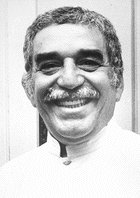

Information on Author
Gabriel Gárcia Márquez
![]() Gabriel
José García Márquez was born on March 6, 1928 in Aracataca, a town in Northern
Colombia, where he was raised by his maternal grandparents in a house filled
with countless aunts and the rumors of ghosts. But in order to get a better
grasp on García Márquez's life, it helps to understand something first about
both the history of Colombia and the unusual background of his family.
Gabriel
José García Márquez was born on March 6, 1928 in Aracataca, a town in Northern
Colombia, where he was raised by his maternal grandparents in a house filled
with countless aunts and the rumors of ghosts. But in order to get a better
grasp on García Márquez's life, it helps to understand something first about
both the history of Colombia and the unusual background of his family.

The most important relatives of García Márquez were
undoubtedly his maternal grandfather and grandmother. His grandfather was
Colonel Nicolás Ricardo Márquez Mejía, a Liberal veteran of the War of a
Thousand Days. He lived in Aracataca, a banana town by the Caribbean, a village
which he helped found. The Colonel was something of a hero to the costeños,
for among other things, he refused to stay silent about the banana massacres,
delivering a searing denunciation of the murders to Congress in 1929. A very
complex and interesting man, the Colonel was also an excellent storyteller who
had lead quite an intriguing life -- when he was younger he shot and killed a
man in a duel, and it is said that he had fathered over sixteen children. He
would speak of his wartime exploits as if they were "almost pleasant experiences
-- sort of youthful adventures with guns." The old Colonel taught the young
Gabriel lessons from the dictionary, took him to the circus each year, and was
the first one who introduced his grandson to ice -- a miracle to be found at the
UFC company store. He also told his young grandson that there was no greater
burden than to have killed a man, a lesson that García Márquez would later put
into the mouths of his characters.
![]()
His grandmother was Tranquilina Iguarán Cotes, and would
be no less an influence on the young García Márquez than her husband. She was
impressively filled with superstitions and folk beliefs, as were her numerous
sisters, and they filled the house with stories of ghosts and premonitions,
omens and portents -- all of which were studiously ignored by her husband, who
once said to young Gabriel, "Don't listen to that. Those are women's beliefs."
And yet listen he did, for his grandmother had a unique way of telling stories.
No matter how fantastic or improbable her statements, she always delivered them
as if they were the implacable truth. It was a deadpan style that, some thirty
years later, her grandson would adopt for his greatest novel.
![]()
García Márquez's parents were more or less strangers to him for the first few years of his life, and the reason behind this is quite interesting. His mother, Luisa Santiaga Márquez Iguarán, was one of the two children born to the Colonel and his wife. A spirited girl, she unfortunately fell in love with a man named Gabriel Eligio García. "Unfortunately," for García was something of an anethma to her parents. For one thing, he was a Conservative as well as la hojarasca, a derogatory term applied to the recent residents of the town drawn by the banana trade. (La hojarasca means "dead leaf," as in something that descends in useless flurries and is best swept away.) García also had a reputation as a philanderer, the father of four illegitimate children. He was not exactly the man the Colonel had envisioned winning the heart of his daughter -- and yet he did, wooing her with violin serenades, love poems, countless letters -- and even telegraph messages. They tried all they could to get rid of the man, but he kept coming back, and it was obvious that their daughter was committed to him. Finally they surrendered to his Romantic tenacity, and the Colonel gave her hand in marriage to the former medical student. In order to ease relations, the newlyweds settled in the Colonel's old home town of Riohacha. (The tragicomic story of their courtship would later be adapted and recast as Love in the Time of Cholera.)(1)
(1) information from:
www.themodernword.com/gabo/gabo_biography.html
For more information consult website.